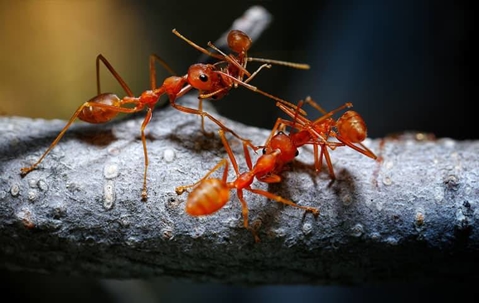Environmental Impact of Parasite Control: Harmonizing Efficiency With Sustainability
The ecological effect of insect control is an essential issue that requires a delicate balance between accomplishing efficiency in handling insects and guaranteeing sustainability of our ecological communities. As we make every effort to secure our crops, homes, and health and wellness from the risks presented by pests, the methods we use can inadvertently harm the environment. From using harmful chemicals that seep into our soil and water to the unintended repercussions on non-target varieties, the repercussions of conventional bug control techniques are significant. Nonetheless, there are arising methods that offer expect a more sustainable method to pest monitoring. These solutions not only aim to resolve the immediate insect troubles yet also consider the long-lasting wellness of our earth.
Dangerous Chemicals in Parasite Control
The utilization of unsafe chemicals in bug control postures significant environmental and health dangers that call for mindful consideration and reduction techniques. Herbicides, pesticides, and chemicals are frequently used to get rid of pests, yet their prevalent application can bring about unexpected effects. These chemicals can pollute soil, water sources, and the air, influencing not only the targeted insects yet additionally helpful insects, wildlife, and human beings.

To deal with these threats, incorporated parasite management (IPM) strategies are being advertised as a more lasting option. IPM includes a combination of approaches such as biological control, habitat control, and the targeted use of chemicals as a last resource (ant control forest nc). By taking on an all natural approach to pest control, we can decrease the environmental and health influences connected with damaging chemicals while efficiently managing pest populaces
Influence On Non-Target Types
Considering the unplanned effects of insect control techniques, the effect on non-target types is an important aspect that calls for thorough assessment. While parasite control steps intend to target certain parasites, various other microorganisms in the environment may be unintentionally impacted. Non-target varieties, including useful insects, birds, creatures, and also plants, can experience straight or indirect injury from pesticide applications or organic control techniques.
Pesticides designed to battle a particular bug pest might hurt pollinators like or natural killers such as ladybugs. Biological control agents, if not species-specific, can present threats to unintentional targets, disrupting the eco-friendly equilibrium.
To mitigate the influence on non-target varieties, integrated pest administration (IPM) approaches that highlight an alternative strategy to pest control are recommended. These approaches prioritize making use of ecologically friendly techniques, lessening harm to useful microorganisms while effectively handling pest populaces. Carrying out complete danger assessments and checking the outcomes of parasite control initiatives are important action in securing non-target species and advertising general community health.
Soil and Water Contamination
Unexpected environmental effects of bug control techniques prolong past influencing non-target types, with substantial effects for dirt and water contamination - ant control services. Pesticides, herbicides, and chemical plant foods used in bug control can seep right into the dirt and pollute groundwater, posing a risk to both earthbound and marine communities.
Water contamination is another crucial issue associated with parasite control practices. Overflow from farming fields treated with pesticides can bring these chemicals into nearby water bodies, affecting water microorganisms and water high quality. Impurities in water sources can have far-reaching repercussions, influencing not only marine life but likewise human health and wellness through the consumption of infected water or aquatic organisms. To mitigate dirt and water contamination from pest control tasks, incorporated pest administration strategies that focus on sustainability and reduce chemical inputs are vital.
Air Pollution From Chemical Usage
Exposure to air-borne pesticides throughout farming applications positions a substantial worry for air pollution control actions. Furthermore, pesticide drift, where chemicals are carried by the wind to unintentional areas, can lead to the contamination of neighboring communities and water bodies.

Strategies for Lasting Pest Control
In the world of agricultural methods, applying sustainable parasite control techniques is extremely important for keeping ecological balance and securing crop yields. Lasting parasite control emphasizes using eco-friendly methods to take care of insect populations successfully while reducing injury to non-target microorganisms and communities. Integrated Parasite Management (IPM) is a widely taken on method that incorporates biological, cultural, physical, and chemical control approaches to achieve long-term parasite monitoring solutions.
Plant rotation and diversification are likewise efficient strategies to interrupt pest life cycles and develop much less favorable conditions for parasites to grow. Ultimately, by incorporating these lasting pest control strategies, farmers can attain a balance in between pest monitoring performance and environmental stewardship.
Verdict
Finally, the ecological influence of insect control methods have to be meticulously considered to balance effectiveness with sustainability. Hazardous chemicals used in pest control can bring about dirt and water contamination, air contamination, and harm non-target types - ant control. It is crucial to carry out sustainable pest control strategies to decrease these unfavorable impacts on the setting and promote a much healthier ecosystem for future generations
By taking on a holistic method to pest control, we can lessen the environmental and health and wellness influences linked with unsafe chemicals while successfully handling pest populations.

To minimize the air pollution triggered by chemical usage, it is crucial to adopt integrated insect monitoring techniques that focus on the use of non-chemical pest control methods, such as plant turning, all-natural killers, and resistant crop ranges. Lasting insect control stresses the usage of ecologically pleasant techniques to manage parasite populaces effectively go to my blog while decreasing damage to non-target organisms and ecological communities. Integrated Bug Administration (IPM) is a commonly adopted method that combines organic, social, physical, and chemical control techniques to attain lasting bug administration options.